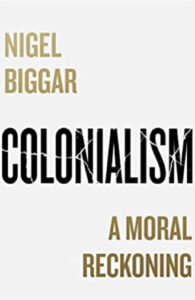In Chapter 3 of A Court at Constantinople, Jemmy Oakeston asks James Bingham, “James, if Britain merely builds an empire, it will suffer the fate of all empires. The question is, what will our empire build?”
A forthcoming book, Colonialism: A Moral Reckoning, by Nigel Biggar, an emeritus professor of theology at the University of Oxford, explores the ethics of the British empire and its legacy. To paraphrase Jemmy, what—according to Biggar—did the British empire build?

As advance reviews of Colonialism have observed, Biggar’s attempt to find ethical purpose in British imperial behaviour has been controversial. As Jonathan Sumption observed in Literary Review, “there are few notions more pious and conventional than that empires are wicked and that the British Empire was unutterably and irredeemably so.” Biggar rejects this perspective and explores the ways in which he believes Britain’s imperial legacy includes ethically defensible ends and means.
I have ordered Biggar’s book because his project, and the controversy it has provoked, is interesting to me. My novel pokes what Britain was attempting to build in pushing the Ottoman empire to undertake political, economic, and legal reforms based on European ideas. It prods the justifications for British policy based on deeming the Ottomans an “uncivilised” nation. It prompts questions about what constitutes progress within, and between, societies with different political, legal, and religious traditions.
According to reviews of his book, Biggar attempts to persuade the reader that the British empire, for all the evils it perpetrated, had an enduring ethical texture that made it different from other imperial enterprises, including its anti-slavery turn in the nineteenth century and its emphasis on the rule of law in the exercise of political power. This latter purported ethical legacy is directly relevant to the themes of power, law, and justice running through A Court at Constantinople. As is criticism of this aspect of Colonialism by The Economist’s reviewer, who noted that “the entire edifice of colonial rule,” including “the operation of justice and the courts, was founded on the alleged superiority of educated white men.”
I will read Biggar’s book to form my own judgement about his ethical analysis of the British empire. And I will keep in mind how my novel forces people from two empires to reckon with how best to meld power and principles to achieve moral ends at home and abroad. As Judge Edmund Hornby asks toward the end of the story, “When does it become necessary, or just, to take another approach, to have a different vision?”
[…] The British empire has also generated fresh acrimony. Commentators believe that imperial nostalgia played an important role in Brexit–Britain’s decision to leave the European Union. Critics of the British empire have turned up the heat by demanding that Britain pay reparations to peoples over whom it once exercised imperial control. Such criticisms and demands prompted an Oxford theologian and ethicist to offer a qualified defense of the British empire. See Nigel Bigger, Colonialism: A Moral Reckoning (2023)–previously mentioned in Earth/Note 4: The Ethics and Evil of Empire. […]